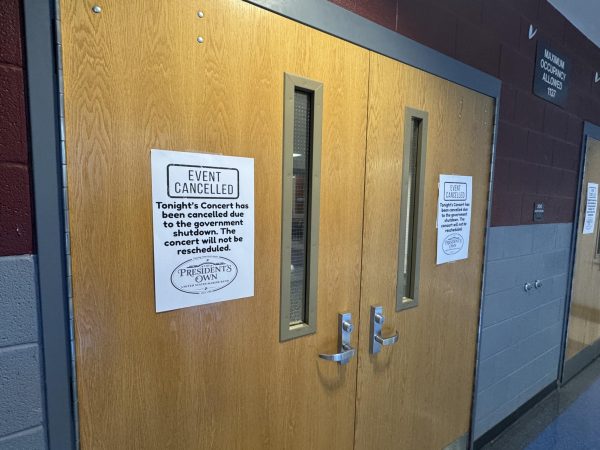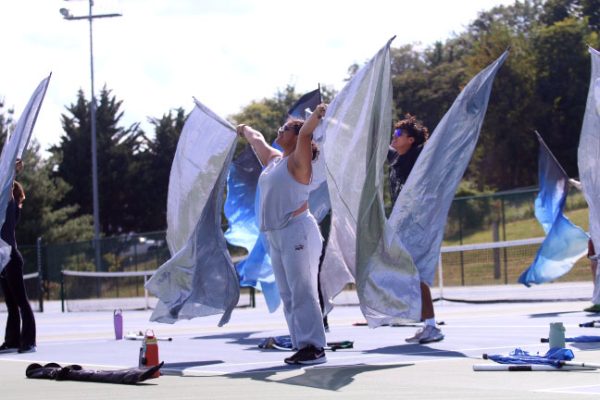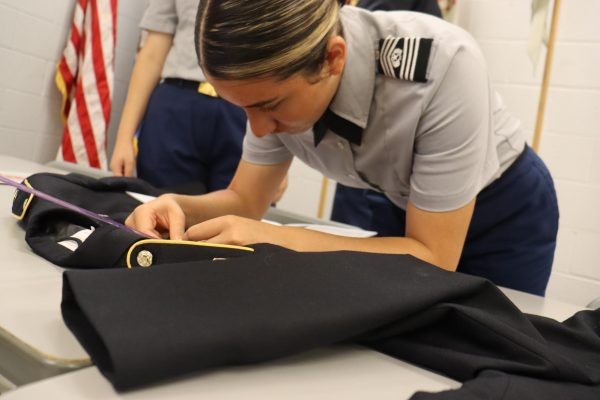HOSA enters second year, anticipates growth
With the second year of Future Health Professionals (HOSA) underway, STEM healthcare teacher and HOSA adviser Jennifer Glazer wanted to hit the ground running. So, she set some goals and got started with her newest group of members.
“[We want to] increase our membership and be involved more in the community. We really feel like this can benefit a lot of people and bring together a new demographic of people interested in healthcare,” Glazer said. “We’re trying to get more people to realize we’re here and doing some awesome things.”
Future Health Professionals, formerly known as Health Occupations Students of America, is an international student organization for those in middle school, high school and college who are interested in a healthcare profession. According to Glazer, participating in HOSA is invaluable particularly because of the out-of-classroom experiences for students.
“[HOSA] gives them opportunities for things we can’t do in the classroom. They also get to compete in a healthcare-themed event, if they choose. Some of them are specific to a career, and some of them are teamwork [or] leadership skills,” Glazer said. “Some of [the] events [are] more based on tri-fold displays, public speaking or debate[s] on a healthcare topic. There’s a wide variety of things, so the exact format really depends on what event you’re doing.”
Already this year, the group has completed their 9/11 remembrance project where they assembled care packages for the four local fire stations, rescue squad, dispatchers and administrative office workers. Their next project will involve raising money for the National Pediatric Cancer Foundation.
In addition to projects of the fundraising nature, HOSA also attends up to three conferences per year: regionals in Stanardsville, Va., states in Williamsburg, Va. and internationals in Houston, Texas, if students qualify. Last year, current junior Leslie Mondragon and senior Christian Arostegui advanced to internationals in Orlando, Fla. Mondragon placed second under the interviewing skills strand and Arostegui was appointed as the Region 5 Vice President for the Virginia Executive Council.
As well as holding the role of vice president, Arostegui is the current president of HOSA at HHS. For him, the process of running for office was intense, but ultimately worth it.
“I was really motivated for it, [and] I didn’t want to let Glazer down. The process was stressful, but it was a good stressful. I knew me taking that position would be [good] to represent us as a school,” Arostegui said.
Arostegui has plans to become either a cardiologist or a family physician, which is part of the reason why he joined HOSA. He has remained an active member because it challenges him in a way school cannot.
“I’m still exploring my interests right now. I enjoy [HOSA] a lot [because I have gotten] really organized, [gained] social skills and leadership opportunities [and collaborated] with others. It’s just opened up my mind [because] I’m out of my comfort zone. I’m a gregarious person, but going to HOSA conferences, I’ve talked to more people and networked a lot. It’s been a great experience for me as a student. Knowing that you can have an impact [on] the future by making a game plan and coming together is pretty cool. It starts small,” Arostegui said.
According to Glazer, this year has already been an improvement compared to when HOSA was just getting off the ground.
“Last year, I had to do a lot of the work to make sure we were up and running. There are a lot of hoops to jump through to get a chapter started,” Glazer said. “Now that we know what to expect and what to do, our officers have been doing awesome and taking control. It’s truly student-led now. [They’re] using me as an adviser [who] guides them and gives them ideas versus me making all of the decisions.”
Arostegui found last year to be difficult, but believes that the group was able to learn from it and that HOSA will run more smoothly this year.
“Getting started last year was a big struggle. It was rough for us, especially Glazer because she really had to push us. The workload was not shared; it was mainly her,” Arostegui said. “We had a fundraiser, Mr. Blue Streak, [last year]. One of our members had to create a gift basket for a student and a teacher, [but] it ended up getting pushed to me. I picked it up last minute [and] ran around the city asking for donations and gift cards. It was a struggle but we learned from it. We’re learning that we need to plan ahead for things. I think this year will be way better [and] I’m looking forward to it.”
Your donation will support the student journalists of Harrisonburg High School. Your contribution will allow us to purchase equipment and cover our annual website hosting costs.










